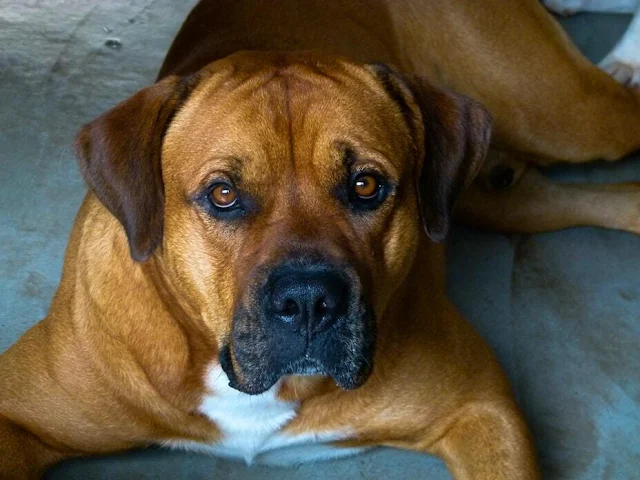Boxweiler Dog Breed Information:
The Boxweiler is a mixed breed dog a cross between the Boxer and Rottweiler dog breeds. Loving, loyal, and bright, these pups inherited some of the best qualities from both of their parents. Boxweilers goes by several other names, including Box Rotty, Boxer Rottie, and Boxie Rottie.
Boxweiler Dog Group: Mixed Breed Dogs.
Boxweiler Height: 21 to 27 inches.
Boxweiler Weight: 70 to 100 pounds.
Boxweiler Life Span: 8 to 13 years.
More About This Dog Breed:
Boxweilers are mixed breed dogs. They are not purebreds like their Boxer or Rottweiler parents. The Boxweiler coats are fawn, black, brindle, white, and brown. Sometimes their coats are solid, and sometimes they have a mix of colors. Boxweilers need at least one good half-hour- to hour-long walk per day with a few good, active play sessions and shorter walks mixed in.
Boxweiler History:
The Boxweiler is believed to have been bred sometime in the 1980s by crossing Boxers and Rottweilers together. Not much is known concerning this mixed breed's background. What we do know is that both the Boxer and Rottweiler breeds have great histories.
Boxweiler Size:
Most weigh in at 70 to 100 pounds and range in height from 21 to 27 inches at the shoulder. However, many can be smaller or larger than normal.
Boxweiler Personality:
Boxweilers are very loving and loyal dogs with lively personalities. This usually means they love running around and playing games like fetch with their pet parents. Even with their high energy, they are also affectionate and love to cuddle inside the house with their human counterparts.
Also Read This : All Dog Breeds - Names and Pictures | Complete List of Dog Profiles
Boxweiler Health:
The Boxweiler mixed breed is predisposed to some of the same conditions that the Boxer and the Rottweiler also face. While most are generally healthy, some may be prone to a few health issues:
Joint dysplasia.
Pano.
Demodectic mange.
Heart issues.
Bone cancer.
Bloat.
Hypothyroidism.
Eye problems.
Boxweiler Care:
As with all dogs, you should keep up with your Boxweiler's regular veterinary checkups to detect any health concerns early. Your vet can help you develop a care routine that will keep your dog healthy. Check their ears for debris and pests daily and clean them as recommended by your vet.
Boxweiler Feeding:
As with all dogs, the Boxweiler’s dietary needs will change from puppyhood to adulthood and will continue to change into their senior years. You should ask your veterinarian for recommendations about your Boxweiler’s diet.
Boxweiler Coat Color And Grooming:
Boxweiler coats are often a mix of their Boxer and Rottweiler parents' coats and colors. The main colors of the Boxweiler coats are fawn, black, brindle, white, and brown. Some of their coats are solid, and some of their coats have a mix of colors. Boxweilers can handle cold or hot temperatures, but make sure to prepare accordingly depending on the extreme conditions of the area you are taking them to.
Boxweiler with Children And Other Pets:
Because the Boxweiler is larger dog, they can easily handle the play of overly excited children. The Boxweiler may prefer to be mostly around adults and older kids who know how to play gently. When it comes to other pets, the Boxweiler can get along with other animals if they are introduced slowly and calmly, and early socialization will help this go smoothly.

